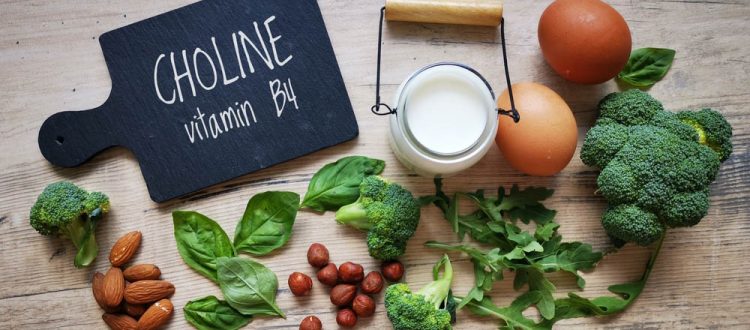Choline Requirements in Menopausal Women and Risk for Organ Dysfunction Modified by the PEMT gene
Choline is an important nutrient that helps with proper function of the brain, muscles, and liver. Choline comes from dietary sources and can be made in the liver by endogenous pathways as phosphatidylcholine. As estrogen levels decrease, choline is especially important for women during transition into menopause.
The enzyme that produces phosphatidylcholine is ‘turned’ on by estrogen, therefore during menopause when estrogen levels fall, there is an increase in susceptibility to choline deficiency and risk of organ dysfunction with a low-choline diet. In a study reported by Fisher et al. (2010), postmenopausal women given a low-choline diet and estrogen had a lower incidence of organ dysfunction compared to those given a placebo, 18% vs 73% respectively. (Fisher 2010) In a similar trial, healthy men (n = 26) and women (n = 31) were given choline restricted diets (<50 mg of choline/d) until they developed signs of organ dysfunction. 70% of men and 80% of postmenopausal women developed symptoms of choline deficiency, as compared to only 44% of premenopausal women, showing the impact of estrogen status on risk for choline deficiency. (Ganz, 2017) Risk for choline deficiency is further increased for those with genetic variations within the PEMT gene.
The PEMT gene produces the enzyme phosphatidylethanolamine-N-methyltransferase (PEMT), which produces phosphatidylcholine. Variations in this gene lead to a decrease in enzyme efficiency and susceptibility to choline deficiency. Furthermore, due to choline’s role as a methyl donor, variations in the MTHFR gene interact with PEMT and a low choline diet to increase the likelihood of high homocysteine, an independent risk factor for cardiovascular disease. (Ganz, 2017)
Phosphatidylcholine is a key component of all cell membranes and affects many biological functions, including:
- Acetylcholine production, important for muscle control, learning, memory and attention
- Fetal development, as seen by the increase demand for choline during pregnancy and lactation
- Liver function and enterohepatic circulation of bile and cholesterol
- Cell membrane fluidity and function
- Mitochondrial function
Choline Deficiency
Many do not consume the RDI of choline. In fact, less than 15% of pregnant women consume the recommended amounts to meet the increase demand during pregnancy.
Choline deficiency is associated with:
- Risk of fetal neural tube defects, pre-eclampsia and preterm birth
- Choline deficiency syndrome and organ dysfunction
- NAFLD (non-alcoholic fatty liver disease), obesity and insulin resistance
- Symptoms of low energy levels, memory loss, cognitive decline, muscle aches, and mood changes
Labs
The follow labs are useful in identify organ dysfunction related to choline deficiency: serum creatine phosphokinase (CPK), aspartate transaminase, alanine transaminase, γ-glutamyl transpeptidase, lactic dehydrogenase and an abdominal ultrasound or MRI to assess liver fat content.
Ensure adequate intake for choline. Adult males should consume at least 550mg daily and adult females should consume at least 425mg daily. It can be found in foods such as meats, fish, nuts, beans, vegetables, and eggs.
References:
- Resseguie, M.E., da Costa, K.-A., Galanko, J.A., Patel, M., Davis, I.J., and Zeisel, S.H. (2011). Aberrant estrogen regulation of PEMT results in choline deficiency-associated liver dysfunction. J. Biol. Chem. 286, 1649–1658.
- Fischer, L.M., da Costa, K.-A., Kwock, L., Galanko, J., and Zeisel, S.H. (2010). Dietary choline requirements of women: effects of estrogen and genetic variation. Am. J. Clin. Nutr. 92, 1113–1119.
- Ganz, A. B., Klatt, K. C. & Caudill, M. A. Common Genetic Variants Alter Metabolism and Influence Dietary Choline Requirements. Nutrients 9, 837 (2017).
- Corbin, K. D. & Zeisel, S. H. Choline Metabolism Provides Novel Insights into Non-alcoholic Fatty Liver Disease and its Progression. Curr Opin Gastroenterol 28, 159–165 (2012).
- https://ods.od.nih.gov/factsheets/Choline-HealthProfessional/

By Dr. Robyn Murphy, ND
Scientific Advisory Board Member

